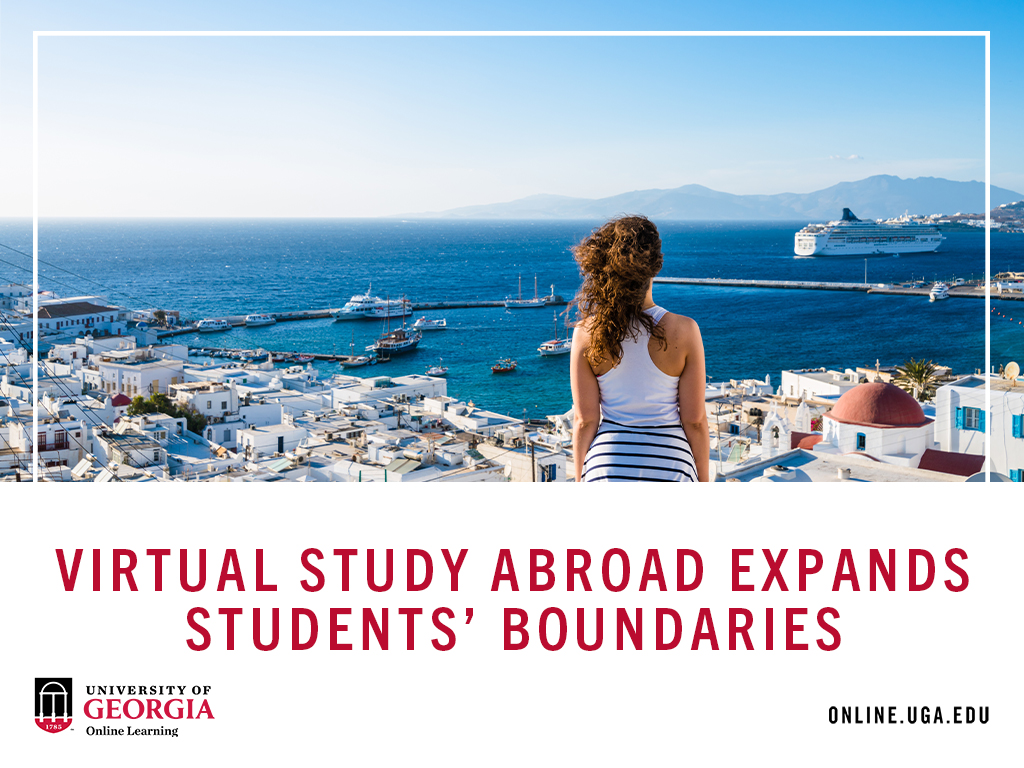Virtual pilot program seeks to make global experiences more accessible
Virtual pilot program seeks to make global experiences more accessible
University of Georgia student Isabel Rutledge couldn’t travel to Greece this summer, but she did get an immersive cultural learning experience thanks to a virtual study tour.

The class was among several global virtual study courses offered this summer to give students international experiences during a period of COVID-related travel restrictions.
Rutledge, who is double majoring in family and consumer sciences and general business, learned about financial planning, housing and consumer economics through the lens of Greek culture, institutions and the lingering effects of the Greek financial crisis.
She and her classmates interacted with faculty in Greece from the Athens University of Economics and Business during live online guest lectures, as well as with representatives of industry and the Greek Central Bank. They learned about cultural sites and history, had discussions with students in Greece, and even shared and prepared Greek recipes.
The class was taught by Effie Antonoudi, a native of Greece who is an instructor and undergraduate coordinator in the College of Family and Consumer Sciences department of financial planning, housing and consumer economics.
“It is amazing to have an instructor who is from the country you are visiting,” Rutledge said, adding that she hopes to visit Greece in the near future. “If it weren’t for this course, I would not have developed the confidence to travel to another country.”
In reconfiguring the course from an in-person to a virtual learning experience, Antonoudi sought to build connections among students—both domestically and internationally—through an emphasis on group projects and discussion.
“We added a component where students interact with students from Greece online so they could exchange experiences and talk about their aspirations,” she said. “We also had students from several majors—like religious studies, political science, engineering—so that really created this immersion of different ideas.”
Virtual internships
For Anna Vo, preparing for her weekly staff meeting at a tech company in Seoul involved getting dressed in business casual at 10 p.m. on Mondays to account for the 13-hour time zone difference.
The marketing and international business double major created graphics for ad campaigns, conducted user surveys and helped revise app interfaces. She also gained insights into South Korean business and tech culture, where everything seems to move quickly and efficiently.
“Seeing different lifestyles and work habits, even if it was merely through our weekly calls, inspired me to want to branch out of my comfort zone and work in a completely different country,” Vo said.
Jennifer Chapman, a senior lecturer who is the director of international business programs in the Terry College of Business, noted that students have completed virtual internships in countries as diverse as Chile, China, Malaysia, Singapore and New Zealand.
“In terms of students being exposed to business-related cultural differences, we haven’t seen much of a diminishment,” Chapman said. “I think that’s because the employers have done such a good job of making sure the online internship experience is fairly representative of what the interns would do in-person.”
She added that her office, in partnership with the university’s Small Business Development Center, also pairs students with Georgia-based companies that have international presences. Adam Jamison, an accounting and international business major, interned with First Performance Global, a Georgia-based fintech company. Over a period of four months, he developed a more comprehensive understanding of the global banking ecosystem through research on government regulations and industry trends in several Latin American countries.
“Although the internship would’ve been different if it were in person, I don’t feel as though I lost out on anything,” Jamison said. “It was definitely the sort of program where you get out of it what you put into it, and perhaps going virtual made this even more true.”
The international internships and virtual study abroad programs were supported by the Office of Instruction and the Office of Global Engagement as part of a pilot program.
Yana Cornish, director of study abroad in the Office of Global Engagement, said that while virtual experiences don’t fully replicate international travel study, they do build intercultural awareness and communication. UGA has one of the nation’s highest study abroad participation rates, and virtual international experiences have the potential to reach a broader range of students.
“We envision this as something that we can offer post-COVID and well into the future,” Cornish said. “The mission of our office is to help students become global citizens, and this helps achieve that.”
The Office of Online Learning is part of the Office of Instruction. UGA continues to expand its offering of online and virtual learning opportunities.
Learn more about the online Master of Science in Financial Planning offered through College of Family and Consumer Sciences.
View the original article on UGA Today here: https://news.uga.edu/virtual-study-abroad-expands-students-boundaries/
